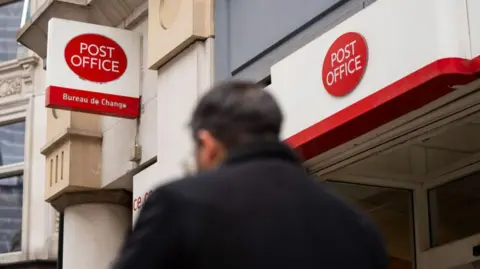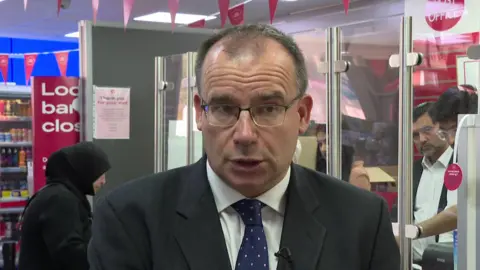Business Reporter
 Getty Images
Getty ImagesPost Office ownership suggests that since it has launched public consultations on the future of the services, it can leave post office ownership in the hands of the postmaster.
Responsible Minister Gareth Thomas said it was time for a “fresh vision” of the service, but the government said there was no plan to reduce the number of branches.
The post office operates counters or shops at over 11,500 locations nationwide, and is entirely nationally run and subsidized by taxpayers.
Plans for reciprocalization have been debated for over a decade, but were on the sidelines as a scandal unfolded over the illegal beliefs of subpostmasters.
The government also said it wanted to change the organization’s culture in the wake of the scandal. It said it saw hundreds of subpostmasters who were mistakenly accused of false accounting and theft at a branch that was running based on data from broken accounting software called Horizon.
The scandal was brought back to the spotlight last week after publishing its initial report after a public investigation into what was wrong, and then focusing on the impact on subpostmasters and their families.
“We all know the harsh legacy, sadly… this is about fixing the underlying issue,” Thomas told the BBC.
The post office had to be transformed so that it was once again trusted by the postman and the public.
However, he also said he hopes for 12 weeks of consultations to begin nationwide discussions on how the organization should run in the future, including mutual ownership and charter models like the BBC.
Changes to the post office structure are unlikely to occur early until 2030, the government said.
The work to replace the Horizon IT system is expected to take three to five years, but the post office should consider the recommendations made by the scandal investigation.

The consultation includes questions about whether the post office is still needed to operate its 11,500 branches. However, Thomas said the government believed the network’s current size was “wide and correct” and did not foresee the closure.
The Minister has also announced an additional £118 million to support work already in progress to provide changes to the post office.
Future services
Similar to ownership issues, the government is seeking opinions on what services the post office should offer in the future, with a particular focus on banks as key lenders continue to close the High Street Branch.
Nowadays, customers can use the post office to pay and withdraw money from most bank accounts.
They can purchase foreign currency, take up welfare benefits forms and payments, and submit a passport application. However, all services are only available on larger sites.
A study published along with the so-called green paper on the future of post offices suggests that a “social value” of £5.2 billion per year will be added to households and £1.3 billion per year to small businesses.
But businesses are struggling to make money and relying on tens of millions of pounds of state subsidies as customers post fewer letters, relying on online services and other carriers, and bypassing post office counters.
According to the Post Office, 99.7% of the population currently lives within three miles of the Post Office, with 4,000 branches open seven days a week.
The post office has already announced that it will shift the last standalone shop remaining in a model where the majority is already running, giving franchise owners the right to provide postal service along with other retail services.
The government said it would not be pursuing a “potentially expensive” change in ownership structure until the post office achieves “financial and operational stability.”
However, two options emerged for the long-term change.
A joint venture between the government and mutually owned postmaster-led organizations can include other employees, customers, and other stakeholders from among the community charter models.
The idea of shared ownership was first raised in 2012 after it was split up from Royal Mail, a service that delivers mail to the door.
Many small businesses already use mutual models, but the most well-known UK companies operate that way. John Lewis Partnership and Co-op.
In mutually run organizations, staff are more closely involved in decision-making and have a greater involvement in business performance.
Last year, Thomas said almost half of the council were profitable, or only a small profit from the postal business. This led to a stagnant payment for the Postmaster.
Cooperative CEO Rose Marley said it is an organization that promotes mutual ownership of businesses. He said that employees owned businesses have proven to be more productive, and in this case the switch could be “truly transformative.”
She said the horizon scandal would be much less under shared ownership.
“Stakeholder-led post offices will be much better at surface concerns early and protecting frontline people,” she said.
“That would be stiff in a culture of sharing transparency and responsibility.”

